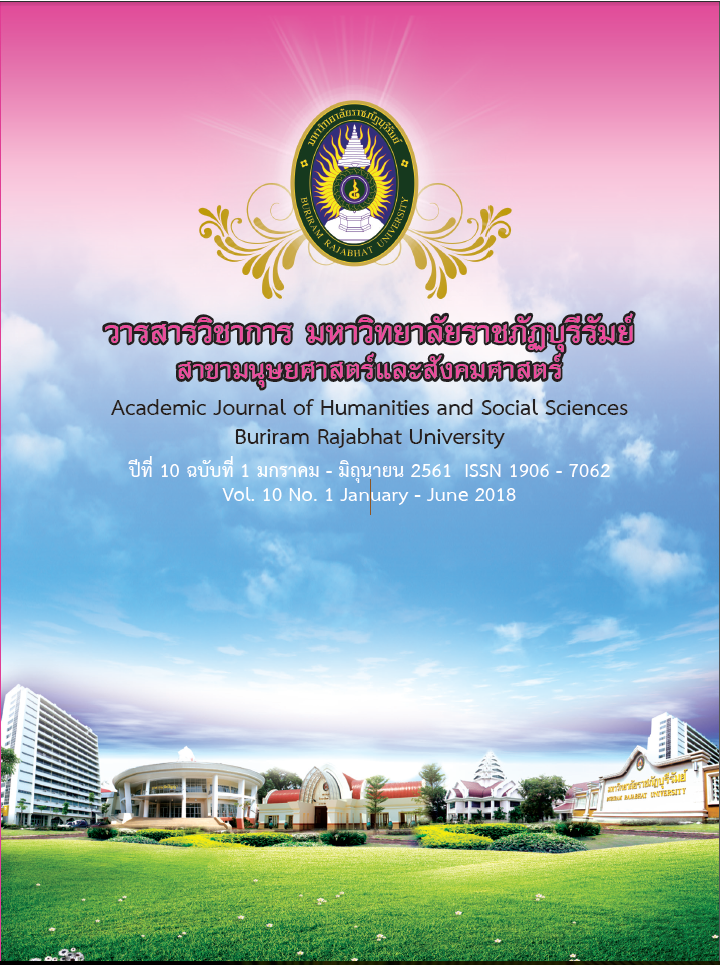การใช้เครื่องมือทางเศรษฐศาสตร์เพื่อลดปริมาณถุงหิ้วพลาสติก นํ้าหนักเบาในสหภาพยุโรป
Main Article Content
บทคัดย่อ
สหภาพยุโรปได้พยายามแสวงหาคำตอบ เพื่อตอบสนองต่อปัญหาการบริโภคถุงหิ้วพลาสติกที่
มากเกินความจำ เป็น จนอาจก่อให้เกิดผลกระทบต่อสิ่งแวดล้อมได้ผ่านการนำ เอากลไกที่เกี่ยวข้องมาใช้ลด
ปริมาณการบริโภคถุงหิ้วพลาสติกที่มีน้าหนักเบาในภูมิภาคยุโรป ํ ซึ่งแต่เดิมมาตรการทางเศรษฐศาสตร์เพื่อ
ลดปริมาณถุงหิ้วพลาสติกน้าหนักเบา ํ เช่น การจัดเก็บค่าธรรมเนียม การจัดเก็บภาษีและข้อกำ หนดของ
กลไกตลาดภายใน ได้เคยถูกนำ มาใช้ในประเทศสมาชิกสหภาพยุโรปบางประเทศ(เช่น ประเทศบัลแกเรีย
ประเทศเดนมาร์ก ประเทศฝรั่งเศส ประเทศไอร์แลนด์และประเทศอังกฤษ เป็นต้น)แต่ในปัจจุบันสหภาพ
ยุโรปได้นำ เอาเครื่องมือทางการคลังและเครื่องมือทางการตลาดมาบรรจุอยู่ในข้อบังคับสหภาพยุโรปที่
2015/720 ว่าด้วยเรื่องของการลดการบริโภคถุงหิ้วพลาสติกน้าหนักเบา ํ เพื่อสร้างเกณฑ์ความรับผิดของ
ในการลดปริมาณถุงหิ้วพลาสติกน้าหนักเบาในประเทศสมาชิกสหภาพยุโรป ํ ข้อบังคับของสหภาพยุโรป
ฉบับล่าสุดนี้สร้างความชัดเจนเกี่ยวกับการนำ เอาเครื่องมือทางเศรษฐศาสตร์มาช่วยกระตุ้นให้ผู้มีส่วนได้
ส่วนเสียเกี่ยวกับการผลิต การจำ หน่าย การบริการและการใช้งานถุงหิ้วพลาสติกน้าหนักเบาในประเทศ ํ
สมาชิกสหภาพยุโรปหันมาดำ เนินมาตรการลดปริมาณการใช้งานถุงหิ้วพลาสติกน้าหนักเบา ํ บทความชิ้นนี้
มุ่งแสวงหาความเหมือนและความแตกต่างระหว่างเครื่องมือทางเศรษฐศาสตร์ที่ประเทศสมาชิกของสหภาพ
ยุโรปได้เคยนำ เอามาปรับใช้เพื่อลดปริมาณถุงหิ้วพลาสติกน้าหนักเบาในประเทศของตน ํ (เช่น ภาษีที่จัดเก็บ
สำ หรับถุงหิ้วพลาสติกบางประเภทและการจัดเก็บค่าธรรมเนียมสำ หรับถุงหิ้วพลาสติกสำ หรับใช้เพียงครั้ง
เดียว)การเปรียบเทียบกลไกและมาตรการต่างๆ ที่ประเทศสมาชิกสหภาพยุโรปบางประเทศได้เคยดำ เนิน
มาตั้งแต่อดีตจนถึงปัจจุบัน ก็อาจสร้างวิถีของการลดการบริโภคถุงหิ้วพลาสติกน้าหนักเบาที่เกินต่อความ ํ
จำ เป็นในระดับสหภาพยุโรปได้บทความฉบับนี้ยังมุ่งที่จะวิเคราะห์อีกว่ากฎหมายสหภาพยุโรปจะสามารถ
ช่วยสนับสนุนให้เกิดการบรรณสานหรือการสร้างความประสานสอดคล้องกันในเรื่องของหลักเกณฑ์และ
วิธีการเพื่อลดการบริโภคถุงหิ้วพลาสติกน้าหนักเบาในระดับภูมิภาคยุโรปได้อย่างไรบ้าง
Article Details
- ต้นฉบับที่ได้รับการตีพิมพ์ในวารสารวิชาการ มหาวิทยาลัยราชภัฏบุรีรัมย์ สาขามนุษยศาสตร์และสังคมศาสตร์ ถือเป็นกรรมสิทธิ์ของมหาวิทยาลัยราชภัฏบุรีรัมย์ ห้ามนำข้อความทั้งหมดหรือบางส่วนไปพิมพ์ซ้ำเว้นเสียแต่ว่าจะได้รับอนุญาตจากมหาวิทยาลัยฯ เป็นลายลักษณ์อักษร
- เนื้อหาต้นฉบับที่ปรากฏในวารสารเป็นความรับผิดชอบของผู้เขียน ทั้งนี้ไม่รวมความผิดพลาด อันเกิดจากเทคนิคการพิมพ์
เอกสารอ้างอิง
Energy and Environment Statistics.
Centrefor thePromotionof Imports from Developing Countries. (2011). EU legislation:
Packaging and packaging waste. (Online). Available URL:http://www.s-ge.com/
sites/default/files/EU%20legislation%20Packaging%20and%20packaging%20
waste.pdf
DanishEcological Council. (2015).Fact sheet: Tax on plastic bags. Copenhagen: Danish
Ecological Council.
DepartmentofEnvironmentand HeritageProtection. (2016). Implementing a lightweight
plastic shopping bag ban in Queensland - Discussion paper. Brisbane City:
Department of Environment and Heritage Protection.
Department of Housing, Planning, Community and Local Government. (2017). Plastic
bag levy. (Online). Available URL: http://www.housing.gov.ie/environment/
waste/plastic-bags/plastic-bag-levy
Deutsche Gesellschaft für Internationale Zusammenarbeit. (2015). Reducing the input
of plastic litter into the ocean around Grenada Applicability and effects
of selected instruments. Bonn: Deutsche Gesellschaft für Internationale
Zusammenarbeit.
Environment Protection Authority. (2016). Plastic shopping bags Options paper:
Practical actions for plastic shopping bags. Sydney: Stateof New South Wales
& New South Wales’ Environment Protection Authority.
EUR-Lex. (2015). Directive (EU) 2015/720 of the European Parliament and of the Council
of 29 April 2015 amending Directive 94/62/EC as regards reducing the consumption
of lightweight plastic carrier bags. (Online). Available URL:http://eur-lex.europa.
eu/legal-content/EN/TXT/?uri=celex%3A32015L0720
Euro Commerce. (2014). Lightweight plastic carrier bags- Posssition Paper on EP
Amendments to Directive 94/62/EC. Brussels: Euro Commerce.
European Commission. (2013). Questions and answers on the proposal to reduce
the consumption of plastic bags. (Online). Available URL: http://europa.eu/
rapid/press-release_MEMO-13-945_en.htm
European Commission. (2015). Packaging and Packaging Waste. (Online). Available
URL: http://ec.europa.eu/environment/waste/packaging/index_en.htm
Frater, L. (2011). Introduction of Single Use Carrier Bag Charge, Wales: Awareness
of and Acceptance by Shoppers in Cardiff. Cardiff: ESRC Centre for Business
Relationships, Accountability, Sustainability and Society.
French Ministry of the Environment, Energy and the Sea. (2016). Energy Transition
For Green Growth Act in Action: Regions-Citizens-Business.Paris: French Ministry
of the Environment, Energy and the Sea (Ministère de l’Environnement,
de l’Energie et de la Mer).
Everett, M. & Priestley, S. (2015). The Single Use Carrier. London: House of Commons.
House of Commons. (2014). Plastic bags Eleventh Report of Session 2013-14.
London: The Stationery Office.
Karlaite, D. (2016). The importance of responsible production and consumption
to overcome the plastic paradox. (Online). Available URL: http://stics.mruni.
eu/wp-content/uploads/2016/07/STICS_2016_4_151-163.pdf
Kasidoni, M., Moustakas,K. & Malamis, D. (2015).“The existing situation and challenges
regarding the use of plastic carrier bags in Europe.” Waste Management
& Research 33 (5), 419–428.
Miller, R. M. (2012). Plastic Shopping Bags: An Analysis of Policy Instruments for
Plastic Bag Reduction. (Online). Available URL: file:///C:/Users/Administrator/
Downloads/Thesis-%20writing%20(1).pdf
PlasticBagBanReport. (2012).Bulgaria Hikes Ecotax on Plastic Bags. (Online). Available
URL: http://plasticbagbanreport.com/bulgaria-hikes-ecotax-on-plastic-bags/
Plastics Europe. (2004). Plastic Shopping Bags: From litting to re-use and resource
recovery. Brussels: Plastics Europe.
Plastics Europe. (2014). View Paper on the European Commission’s proposal on
lightweight plastic carrier bags COM(2013) 761 final. Brussels: Plastics Europe.
Plastic News Europe. (2012). Bulgaria to increase plastic bag tax by 233%. (Online).
AvailableURL:http://www.plasticsnewseurope.com/article/20120628/PNE/306289967/
bulgaria-to-increase-plastic-bag-tax-by-233
Ségolène Royal New COP21 President. (2016). Stop Plastic Waste: Launch of the
International Coalition. (Online). Available URL: http://www.developpement-
durable.Gouv.fr/IMG/pdf/GB_Coalition_sacs_plastique_DEF.pdf
Watkins, E. et al. (2012). Use of Economic Instrument and Waste Management
Performances - Final Report. Paris: European Commission Directorate General
for Environment.
Withana,S.,Brink,P.T., Illes, A., Nanni,S. &Watkins,E. (2014).Environmental Tax Reform
in Europe: Opportunities for the future. London: Institute for European
Environmental Policy


